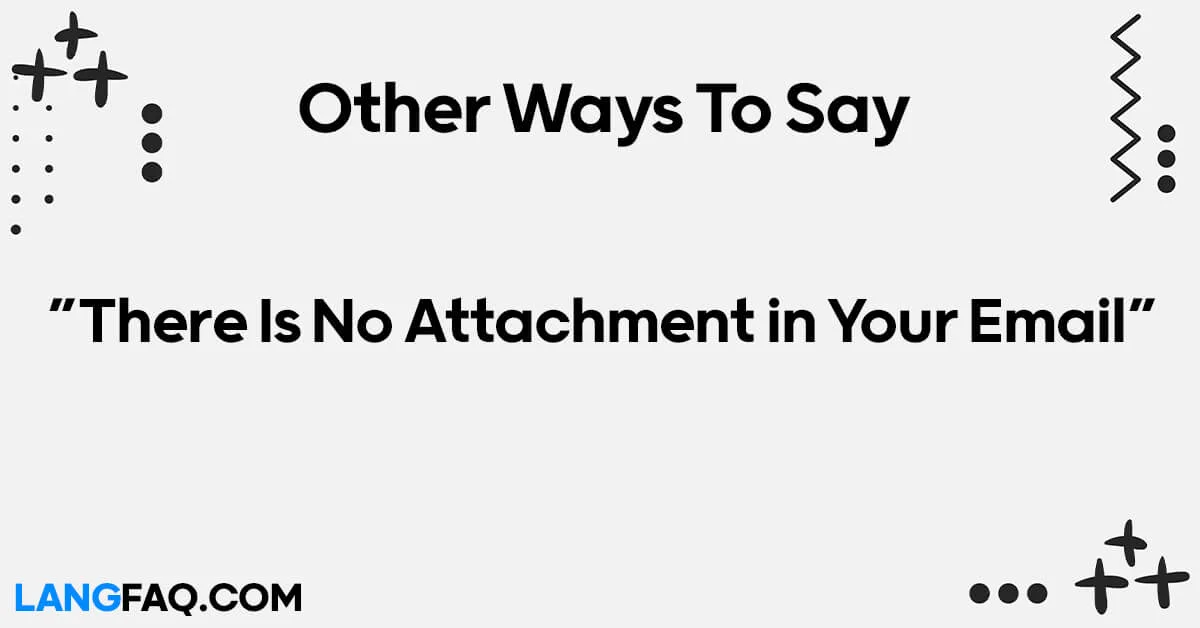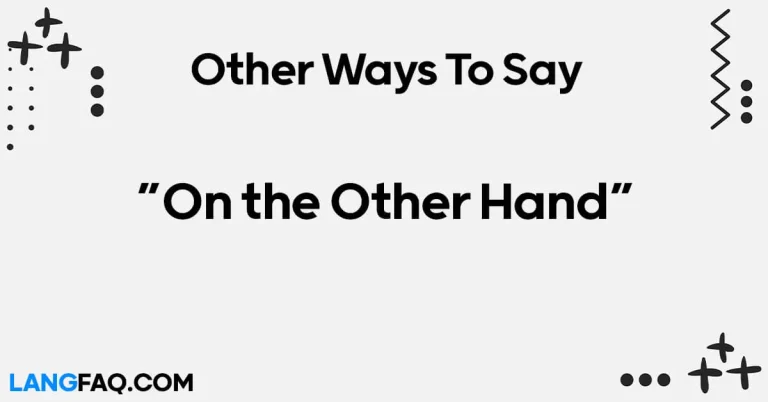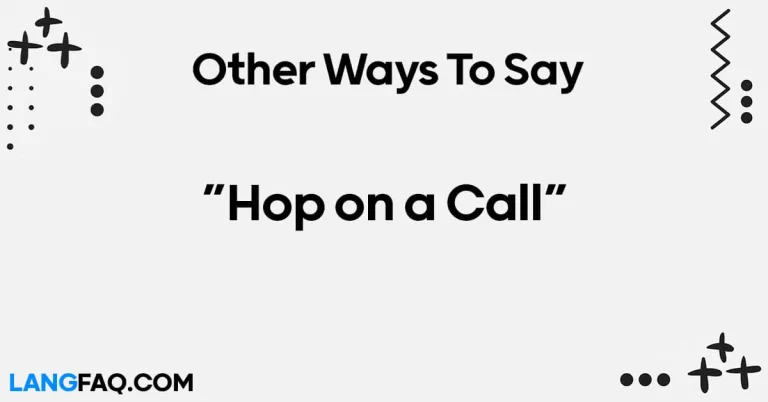In the fast-paced world of emails and digital communication, mastering the art of conveying messages professionally is crucial. One common scenario is realizing you forgot to attach a file. Instead of the mundane “There is no attachment,” explore 12 engaging ways to express this oversight gracefully.
12 Other Ways to Say “There Is No Attachment in Your Email”
Here are 12 alternative ways to express “There is no attachment in your email”:
- Regrettably, the email is attachment-free this time.
- Apologies, but it seems the attachment missed the memo.
- Unfortunately, the attachment decided to take a rain check.
- Kindly note the absence of any accompanying files in this email.
- Apologies, the attachment is currently MIA (Missing In Action).
- In the absence of an attachment, let’s focus on the message itself.
- Oops! The attachment seems to have taken a detour.
- Apologies for the stealthy attachment – it’s playing hide and seek.
- Regretfully, the email is flying solo without any attachments.
- Apologies, the attachment seems to be on a brief hiatus.
- Unfortunately, the attachment missed the email bus – it will catch the next one.
- No attachment here – it must have chosen another inbox adventure.
| Expression | Meaning | Example |
|---|---|---|
| Regrettably, the email is attachment-free this time. | Expressing the absence of an attachment with regret. | “Regrettably, the email is attachment-free this time. My apologies.” |
| Apologies, but it seems the attachment missed the memo. | Conveying the oversight of the attachment with a playful tone. | “Apologies, but it seems the attachment missed the memo. Sending it now.” |
| Unfortunately, the attachment decided to take a rain check. | Describing the attachment’s absence in a casual and apologetic manner. | “Unfortunately, the attachment decided to take a rain check. Resending it shortly.” |
| Kindly note the absence of any accompanying files in this email. | Politely informing the recipient about the missing attachment. | “Kindly note the absence of any accompanying files in this email. Appreciate your understanding.” |
| Apologies, the attachment is currently MIA (Missing In Action). | Using a military acronym humorously to indicate the missing attachment. | “Apologies, the attachment is currently MIA. Let me attach it for you.” |
| In the absence of an attachment, let’s focus on the message itself. | Redirecting attention to the email’s content despite the missing attachment. | “In the absence of an attachment, let’s focus on the message itself. Your feedback is appreciated.” |
| Oops! The attachment seems to have taken a detour. | Playfully suggesting that the attachment has gone astray. | “Oops! The attachment seems to have taken a detour. Sending it directly to you.” |
| Apologies for the stealthy attachment – it’s playing hide and seek. | Using a game metaphor to add a light-hearted touch to the situation. | “Apologies for the stealthy attachment – it’s playing hide and seek. Found and attached now.” |
| Regretfully, the email is flying solo without any attachments. | Expressing regret while humorously describing the email’s solo status. | “Regretfully, the email is flying solo without any attachments. Attaching them now.” |
| Apologies, the attachment seems to be on a brief hiatus. | Using a temporary break metaphorically to describe the attachment’s absence. | “Apologies, the attachment seems to be on a brief hiatus. Back now – attached for your reference.” |
| Unfortunately, the attachment missed the email bus – it will catch the next one. | Employing a transportation metaphor to explain the delay in sending the attachment. | “Unfortunately, the attachment missed the email bus – it will catch the next one. Sending shortly.” |
| No attachment here – it must have chosen another inbox adventure. | Imagining the attachment’s actions humorously, providing an engaging twist. | “No attachment here – it must have chosen another inbox adventure. Located and attached for you.” |
In navigating the common scenario of missing attachments, these creative expressions offer a balance of professionalism and humor, ensuring effective communication while addressing the oversight. Employing such alternatives not only conveys the necessary information but also adds a touch of personality to your email interactions.
Is It Correct to Say “There Is No Attachment in Your Email”?
Yes, the phrase “There is no attachment in your email” is grammatically correct and commonly used to inform someone that the email they sent lacks an attached file or document. This straightforward statement is clear and direct, allowing the recipient to be aware of the absence of any supplementary materials.
However, for variety and to add a touch of creativity to your communication, you might consider using alternative expressions like those discussed earlier. While the original phrase is entirely correct and widely accepted, incorporating different ways to convey the same message can make your emails more engaging and memorable, especially in professional or casual settings where a more personalized touch is appreciated.
In summary, the correctness of the statement is not in question, but exploring diverse and inventive ways to communicate the same information can enhance your overall communication style.
Professional Mail Example With “There Is No Attachment in Your Email”
Subject: Important Report – Clarification on Attachment
Dear [Recipient’s Name],
I trust this message finds you well. I am writing to bring to your attention that there seems to be a small oversight in the email you sent earlier. Regrettably, there is no attachment in your email, and I wanted to ensure this wasn’t unintentional.
If there was intended to be a document or file attached, kindly resend it at your earliest convenience. Your prompt attention to this matter is greatly appreciated.
Thank you for your understanding, and I look forward to receiving the necessary information soon.
Best regards,
[Your Full Name] [Your Position] [Your Company] [Your Contact Information]
Regrettably, the Email is Attachment-Free This Time
In the realm of professional communication, expressing regret can soften the impact of an oversight. Using phrases like “Regrettably, the email is attachment-free this time” adds a layer of formality while acknowledging the mistake. This approach is suitable for formal settings, such as professional correspondence or business-related emails.
Scenario:
Imagine you’re corresponding with a client, and you forgot to attach a crucial document to your email. In this case, expressing regret is essential to maintain a positive client relationship.
Example Sentence:
“Regrettably, the email is attachment-free this time. My sincere apologies for any inconvenience caused. Please find the attached document now.”
Email Sample:
Subject: Important Document Attached – Apologies for the Oversight
Dear [Client’s Name],
Regrettably, the email is attachment-free this time. My sincere apologies for any inconvenience caused. Please find the attached document now.
Thank you for your understanding.
Best regards, [Your Name]
Apologies, but It Seems the Attachment Missed the Memo
Injecting a playful tone into your email can humanize the situation. Phrases like “Apologies, but it seems the attachment missed the memo” add a touch of humor while addressing the absence of a file. This approach is versatile and can be used in both formal and informal contexts.
Scenario:
Picture a scenario where you’re communicating with colleagues in a project update email. The tone here is slightly more relaxed, making it suitable for workplace relationships.
Example Sentence:
“Apologies, but it seems the attachment missed the memo. Here’s the file for your review – better late than never!”
Email Sample:
Subject: Project Update – Attachment Included This Time!
Hi Team,
Apologies, but it seems the attachment missed the memo. Here’s the file for your review – better late than never! Let me know if you have any questions.
Thanks, [Your Name]
Unfortunately, the Attachment Decided to Take a Rain Check
Expressing disappointment in a lighthearted manner can make your email memorable. Phrases like “Unfortunately, the attachment decided to take a rain check” infuse creativity while maintaining professionalism. This approach is best suited for situations where a more casual tone is appropriate.
Scenario:
Consider a scenario where you’re communicating with a friend or a casual acquaintance. This approach adds a touch of personality to your message.
Example Sentence:
“Unfortunately, the attachment decided to take a rain check. I promise it’ll join us for the next email hangout!”
Email Sample:
Subject: Weekend Plans – Attachment Taking a Rain Check
Hey [Friend’s Name],
Unfortunately, the attachment decided to take a rain check. I promise it’ll join us for the next email hangout! Check it out now.
Cheers, [Your Name]
Kindly Note the Absence of Any Accompanying Files in This Email
In more formal settings, choosing a polite and direct approach can convey the necessary information without unnecessary embellishments. Phrases like “Kindly note the absence of any accompanying files in this email” maintain a professional tone.
Scenario:
Imagine you’re corresponding with a supervisor or someone in a higher professional hierarchy. Clarity and directness are key in such situations.
Example Sentence:
“Kindly note the absence of any accompanying files in this email. Your prompt attention to this matter is appreciated.”
Email Sample:
Subject: Important Update – Please Review
Dear [Supervisor’s Name],
Kindly note the absence of any accompanying files in this email. Your prompt attention to this matter is appreciated. If you require further information, feel free to reach out.
Best regards, [Your Name]
Apologies, the Attachment is Currently MIA (Missing In Action)
Injecting humor into a professional setting can make you more relatable. Using a term like “MIA (Missing In Action)” lightens the mood while addressing the absence of an attachment. This approach works well in various professional contexts, especially with colleagues you have a more familiar relationship with.
Scenario:
Consider a scenario where you’re updating your team on a project, and the attachment is missing. Adding humor can ease any potential tension.
Example Sentence:
“Apologies, the attachment is currently MIA. I’ve sent out a search party – it should be back shortly!”
Email Sample:
Subject: Project Update – Attachment MIA
Hi Team,
Apologies, the attachment is currently MIA. I’ve sent out a search party – it should be back shortly! In the meantime, feel free to reach out with any questions.
Best, [Your Name]
In the Absence of an Attachment, Let’s Focus on the Message Itself
Shifting the focus away from the missing attachment and towards the email’s content is a strategic move. Phrases like “In the absence of an attachment, let’s focus on the message itself” steer the recipient’s attention positively.
Scenario:
Imagine you’re corresponding with a client or colleague, and the attachment is less critical than the email’s core message. Redirecting focus can avoid unnecessary concerns.
Example Sentence:
“In the absence of an attachment, let’s focus on the message itself. Your feedback on the outlined strategy is invaluable.”
Email Sample:
Subject: Strategic Plan Discussion – Your Input Needed
Dear [Recipient’s Name],
In the absence of an attachment, let’s focus on the message itself. Your feedback on the outlined strategy is invaluable. Looking forward to your insights.
Best regards, [Your Name]
Oops! The Attachment Seems to Have Taken a Detour
Playful and informal language can be effective in certain professional settings. Phrases like “Oops! The attachment seems to have taken a detour” convey a light-hearted acknowledgment of the mistake.
Scenario:
Picture a scenario where you’re communicating with a colleague you share a friendly rapport with. This approach adds a personal touch to your message.
Example Sentence:
“Oops! The attachment seems to have taken a detour. It’s back on track now – attached for your review!”
Email Sample:
Subject: Team Update – Attachment on a Detour
Hi [Colleague’s Name],
Oops! The attachment seems to have taken a detour. It’s back on track now – attached for your review! Let me know if you have any thoughts.
Cheers, [Your Name]
Apologies for the Stealthy Attachment – It’s Playing Hide and Seek
Using playful metaphors can make your emails more engaging. Phrases like “Apologies for the stealthy attachment – it’s playing hide and seek” create a memorable and light-hearted tone. This approach works well with colleagues or clients you share a comfortable relationship with.
Scenario:
Imagine you’re corresponding with a client, and the attachment was difficult to locate. Adding a playful touch can lighten the situation.
Example Sentence:
“Apologies for the stealthy attachment – it’s playing hide and seek. Found and attached for your convenience!”
Email Sample:
Subject: Important Document Found – Apologies for the Hide and Seek
Dear [Client’s Name],
Apologies for the stealthy attachment – it’s playing hide and seek. Found and attached for your convenience! Please review at your earliest convenience.
Thank you, [Your Name]
Regretfully, the Email is Flying Solo Without Any Attachments
Adding a touch of formality while acknowledging the missing attachment is crucial in professional settings. Phrases like “Regretfully, the email is flying solo without any attachments” convey a sense of responsibility and regret.
Scenario:
Consider a scenario where you’re corresponding with a supervisor or a client. Maintaining a formal tone is essential in such situations.
Example Sentence:
“Regretfully, the email is flying solo without any attachments. I appreciate your understanding and am happy to resend with the necessary files.”
Email Sample:
Subject: Revised Proposal – Regretful Oversight
Dear [Recipient’s Name],
Regretfully, the email is flying solo without any attachments. I appreciate your understanding and am happy to resend with the necessary files. Your prompt attention to this matter is highly valued.
Best regards, [Your Name]
Apologies, the Attachment Seems to Be on a Brief Hiatus
Employing a metaphor to explain the absence of an attachment can add creativity to your emails. Phrases like “Apologies, the attachment seems to be on a brief hiatus” use a temporary break metaphorically. This approach works well in various professional contexts, especially with colleagues.
Scenario:
Imagine you’re updating your team on a project, and the attachment is momentarily unavailable. Adding a touch of creativity can lighten the mood.
Example Sentence:
“Apologies, the attachment seems to be on a brief hiatus. Back now – attached for your reference!”
Email Sample:
Subject: Project Update – Attachment Brief Hiatus
Hi Team,
Apologies, the attachment seems to be on a brief hiatus. Back now – attached for your reference! Let me know if you need any further information.
Best, [Your Name]
Unfortunately, the Attachment Missed the Email Bus – It Will Catch the Next One
Employing a transportation metaphor can make your emails more engaging. Phrases like “Unfortunately, the attachment missed the email bus – it will catch the next one” use a playful metaphor to explain the delay. This approach is suitable for various professional contexts, especially with colleagues or clients.
Scenario:
Consider a scenario where you’re updating a client on a project, and the attachment is delayed. Adding a playful touch can maintain a positive tone.
Example Sentence:
“Unfortunately, the attachment missed the email bus – it will catch the next one. In the meantime, feel free to reach out with any questions.”
Email Sample:
Subject: Project Update – Attachment on the Next Bus
Dear [Client’s Name],
Unfortunately, the attachment missed the email bus – it will catch the next one. In the meantime, feel free to reach out with any questions. Your patience is appreciated.
Best regards, [Your Name]
No Attachment Here – It Must Have Chosen Another Inbox Adventure
Adding a touch of whimsy and imagination to your emails can make them more memorable. Phrases like “No attachment here – it must have chosen another inbox adventure” humanize the attachment, turning a routine statement into an adventurous narrative.
Scenario:
Imagine you’re corresponding with a colleague or friend. Injecting humor and creativity can make your email stand out in a positive way.
Example Sentence:
“No attachment here – it must have chosen another inbox adventure. Fear not, it’s back and ready for duty!”
Email Sample:
Subject: Inbox Adventure – Attachment Edition
Hi [Recipient’s Name],
No attachment here – it must have chosen another inbox adventure. Fear not, it’s back and ready for duty! Check it out now.
Cheers, [Your Name]
FAQs
- How can I politely mention the absence of an attachment in an email? Ensure your tone remains polite and professional. Choose phrases like “Regrettably, the attachment is missing” or “Apologies, the attachment forgot to join the email.”
- Is it necessary to apologize for a missing attachment? While not mandatory, a brief apology adds a touch of humility and professionalism to your communication, fostering a positive impression.
- Can I inject humor into my email when addressing a missing attachment? Yes, a light-hearted approach can be effective. Phrases like “Unfortunately, the attachment seems to be on a coffee break” add a personal touch to your emails.
- How do I seek confirmation without sounding accusatory? Use phrases like “Kindly confirm if the attachment is received” to seek confirmation without implying blame.
- Are creative phrases suitable for professional emails? When used judiciously, creative phrases can enhance your emails, making them memorable. However, gauge the recipient’s tone and the context of your communication.
- Should I resend the email with the attachment mentioned? It’s advisable to resend the email with a brief clarification, ensuring the recipient is aware of the missing attachment.
Conclusion:
Mastering professional communication involves navigating common pitfalls gracefully. By incorporating these 12 creative ways to express the absence of an attachment, you’ll elevate your email etiquette and leave a lasting positive impression. Effective communication is an art, and with these alternatives, you’re well on your way to becoming a virtuoso.







